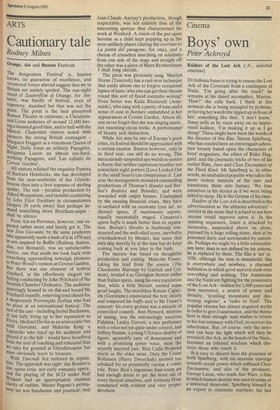Cinema
Boys' own
Peter Ackroyd
Raiders of the Lost Ark ('A', selected cinemas) Dr Indiana Jones is trying to rescue the Lost Ark of the Covenant from a contingent of Nazis. 'I'm going, after the truck!' he screams at his dazed accomplice, Marion. 'How?' she calls back. I think at this moment she is being strangled by pythons, or having her wardrobe ripped up in front of her; something like that. 'I don't know,' Jones yells as he races away on an improvised stallion, 'I'm making it up as I go along!' These might have been the words of the director of this film, Steven Spielberg, who has created here an extravagant adventure loosely based upon the characters of boys' magazines, the ethics of Rider Haggard, and the cinematic tricks of two of his earlier films, Jaws and Close Encounters of the Third Kind. Mr Spielberg is, in other words, an unabashed populist who takes the more violent instincts of the race and transforms them into fantasy. We lose ourselves in his stories as if we were being lulled to sleep. He is the Grimm of his time.
Raiders of the Lost Ark is described in the advertisement as 'the ultimate adventure' — correct in the sense that it is hard to see how anyone could improve upon it. In the opening sequences, Jones is attacked by tarantulas, suspended above an abyss, pursued by a huge rolling stone, shot at by poisoned darts and surrounded by cannibals. Perhaps we might try a little existentialism here: man is not defined by his actions, he is replaced by them. The film is 'set' in 1936, although the time is immaterial: this is everywhere and nowhere, a charmed habitation in which good and evil clash over everything and nothing. The Americans and the Nazis are fighting for the possession of the Lost Ark — hidden for 3,000 years and now recovered, a source of power and divinity, 'levelling mountains and destroying regions', a 'radio to God'. The popular cinema has always required myths in order to give it sustenance, and the theme here is clear enough: man wishes to return to his lost intimacy with God, to recover his inheritance. But, of course, only the innocent can bear the light which will then be revealed; the Ark, in the hands of the Nazis, becomes an infernal machine which destroys those who touch it.
It is easy to discern here the presence of both Spielberg, with his atavistic cravings towards occult power which suffused Close Encounters, and also of the producer, George Lucas, who made Star Wars, a film in which human destiny was seen in terms of a universal shoot-out. Spielberg himself is an expert in cinematic mayhem; his last film, 1941, was really only a series of comic disasters and spectacular special effects, turning the world into a fairground which was running at the wrong speed. In similar fashion, Raiders of the Lost Ark moves from Peru toAmerica to Nepal to Egypt ;there are submarines and snakes and subterranean palaces and ancestral curses. It is intensely watchable, with the relentless accumulation of effects used here for the purposes of eliciting suspense rather than provoking comedy.
Indiana Jones is played here by Harrison Ford, whom we last saw in Star Wars as the impetuous space crusader; here he takes his particular dead-pan qualities a stage further, and specialises in what might be called characterless acting. Every movement, every facial gesture, is the one you would expect him to make. His comrade, Marion, is played by Karen Allen in the new American tradition of the 'good sport', the heroine who has evolved out of Women's Lib and has now left it behind, who can 'rough it' one minute and wear a diaphanous gown the next. The important thing about such characters is that we know they are not real, and therefore more easily believe in them.
The only danger — and it is one that the film does not wholly avoid — is that of turning such matters into parody. A film which depends upon over-statement should not, I think, too often advert to the fact. Mr Spielberg is now so much the master of cinematic technique that he is inclined to take his own powers of construction less seriously than the film actually requires. His facility leads him to the easy laugh, the self-conscious moments of bravura. In the process, Raiders of the Lost Ark becomes too arch, too much a parody of adventure and too little of an adventure itself.



































 Previous page
Previous page